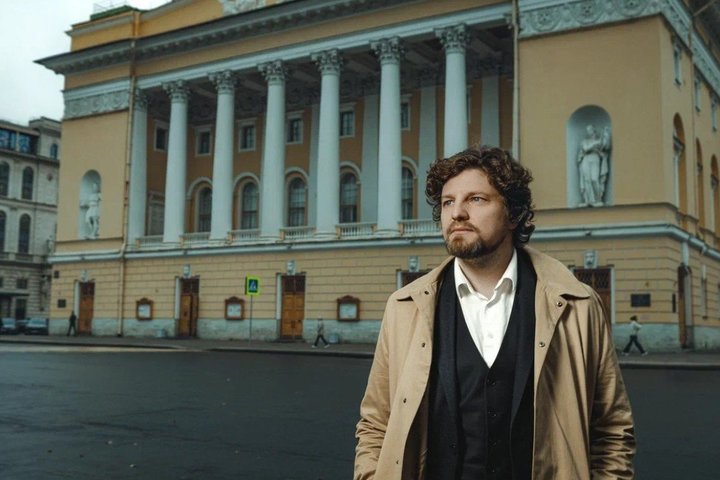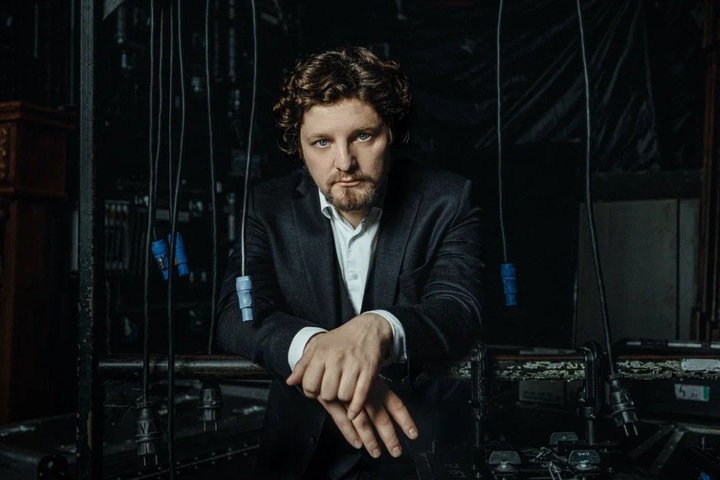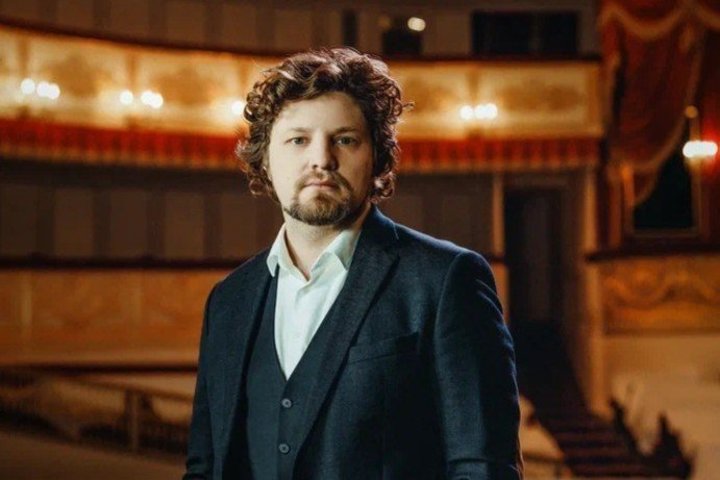Alexander Malich: ‘There is no art without experimentation, if there is no experimentation, there is no art’
Director of the Alexandrinsky Theatre on the trials of the pandemic, laboratories and young directors

Alexander Malich was one of the guests of the open council of the Association of National Theatres. In August last year, after five years of working as the general producer of the New Stage of the Alexandrinsky Theatre, he was appointed director of the entire National Drama Theatre of Russia (Alexandrinsky Theatre). Malich spoke about how this happened, what trends Saint Petersburg set and for whom new directors are being sought in an interview with Realnoe Vremya.
How Fokin called Malich
Alexander, you worked as a television and radio journalist for many years. And now you have quit?
Why? I work at Kultura (editor's note: TV channel Rossiya-Kultura), we do projects, shoot films. When I started working at the Alexandrinsky, I stayed in Saint Petersburg on television for some time on a permanent basis — with a position in the editorial office, with an entry in my work record book. But it turned out to be simply impossible to combine: there is not enough time for weekly broadcasts or programs. But in project work, this combination is possible: for example, on the Rossiya-Kultura channel, we are doing Dominants project about cultural figures and the events in their professional history, thanks to which they became famous. Recently, in February, the Winter Theatre was used to make the Yuri Bashmet Festival Diaries — the International Winter Arts Festival in Sochi.
When you were appointed general producer of the New Stage of the Alexandrinsky, Valery Fokin was quoted in the press: “Malic's proposals seemed interesting to me.” What were these proposals, were they implemented?
It was like this: we did an interview for my YouTube channel with Valery Fokin, and after that he suggested that I take up the New Stage. And I was perplexed, because I decided that I should advise him on someone. And it turns out that he suggested me. If we are talking about the New Stage, then my arrival was marked by the beginning of COVID. I came in 2019, and COVID began six months later. Therefore, many of the proposals that we planned to implement changed due to circumstances. But in five years, we managed to reboot the site and make it the kind of centre for interdisciplinary art that Valery Fokin originally planned. We have many different programs there — new dance, new media, and new music. We built a system with permanent partners, opened a summer music festival. We created the New Stage Live project, where young musicians perform, we make videos for them, which supports them well. In 2024, the large Meyerhold Studies project took place. In general, half of what was planned in 2019 was implemented, and the other half simply changed.
It is believed that the pandemic shook the theatre a lot, in the new realities it was necessary to switch to “digital,” somehow communicate with the audience differently, come up with something new.
Alexandrinsky was the first in this regard. When everything started to close, we had the premiere of the play Mauser by Theodoros Terzopoulos on the Historical Stage. It became clear that the audience would not be allowed in at all, the premiere was already scheduled, we quickly began to organize something and made the first online premiere in the history of Russian theatre, at least during the pandemic. Since I have a television background, we quickly figured out how to film it. Then I agreed with the satellite operator Tricolour. Interestingly, at first I called several large online platforms. Everyone refused, saying that no one would watch it: “We won't take it on, we're not interested, it's all nonsense.”
And we came to an agreement with Tricolour because we knew the head of marketing. The broadcast was watched by 300 thousand people via satellite. That's a lot for a theatre. After that, as I understand it, a wave of online broadcasts of everything and everyone started, because everyone realized that such content actually works and is worth watching. Although, of course, you can't say that this is theatre in the literal sense of the word: a broadcast does not replace a theatre, unless, of course, the performance is staged specifically for video.

And you still have to learn how to do this.
Yes, yes, so everyone perked up — both theatres and museums. On the other hand, during the pandemic, everyone was spoiled by high viewing figures. And then when the pandemic ended, how is it possible: we have 100 thousand views, and before there were a million. And people start talking about how this direction is not so popular. But if you take the Historical Stage of the Alexandrinsky Theatre, then this is 940 seats, and the performance was watched online by 10 thousand people, and this is 10 halls. I am rounding off a lot, but this is a lot. In principle, theatre is an elite art, not in the economic sense, but in the fact that a small number of people can end up in the theatre hall compared to a hockey or football stadium.
“The Alexandrinsky is a huge machine”
You were appointed director of the theatre in August last year, and by the way, the Alexandrinsky festival began at the same time. It turns out that you were immediately thrown into the thick of things.
I was appointed, and the season began. Everything was unexpected. It is clear that the processes were launched by the previous team. But Alexandrinsky is a huge machine and a powerful structure, the work does not stop from changing the director, nothing terrible happened. But for me, the first few months were a special experience, they were very exciting, fascinating.
Are you getting any additional education in connection with this appointment?
Firstly, for many years I have produced large projects on television, and secondly, five years at the New Stage did not pass by. I am familiar with this theatre, I understand how it works. Naturally, from the position of the director, everything looks a little different: the tasks are different, and their quality and quantity. But so far we are coping.
I think it is very important to feel the theatre. This is not a soulless place, it is alive, you need to know how to interact with it. Five years is quite a long time. I would not say that I got used to the theatre, it got used to me, I manage to establish contact with it. I hope I will be useful to it.
I read that you have already reassembled the marketing department. How did this happen?
All the guys are a new team now. When the top management level changed, some people started leaving the theatre. This is natural, I did not fire anyone and did not ask anyone to leave. People just got used to working in one team. We had to hire a new marketing department. When this started happening, it was impossible to put the theatre on pause, we could not stop and spend six months looking for people, negotiating with them, training them. So we started recruiting people in the process. Looking for employees in the theatre at the beginning of the season is a rather utopian task, usually all the professionals are already working, at least for the next season. We had to work hard. Fortunately, everything is fine with sales.
And did the audience notice anything? Maybe social networks have changed?
We run social media a little differently: we stopped making them super-selling, and more — communicating with the audience. We added additional products — in the marketing sense. Now, for example, we have introduced gift certificates. We began to place advertisements differently, we began to position ourselves differently in some places. In general, we live in conditions of attendance of 92-100%, which, of course, is very good, because some performances run for several years, and we have full houses. And my colleagues deserve a lot of credit for this, because they began to segment the audience a little differently and promote our products quite accurately.

“We said that it is not even necessary to have a theatre education”
I would like to ask about the play “Resurrection” by Nikita Kobelev, which was shown on the New Stage, and then moved to the Historical. What does this mean, is this the evolution of the performance?
It is evolution, of course. After all, the New and Historical Stages are mutually complementary vessels. Please note that we do not call them the Main and the New. These are different structures. At the same time, the repertoire performances are performed by the same troupe. In general, this is more a question for the artistic management than for the administrative one. But I will answer it briefly. When Resurrectionwas released on the New Stage, it became clear that the performance could be performed on the big one. Therefore, it was decided to move it. Of course, this is not the same as moving an icon on a tablet, it is a difficult job. I will not say that this often happens at the Alexandrinsky Theater. But in my memory, this is the first such example.
2025 has been declared the Year of Young Directors in your theatre. How many applications are coming in?
We have four laboratories. Each of them has already received about 35-40 applications through the open call, and is still accepting applications. Overall, this is a lot. The committee in each laboratory selects them, and they have already accepted guys for one (here, in the end, there were 52 applications). There are different formats everywhere. In some, the result is a production. And in some, we first train people as a laboratory, this is the Art & Science format. Directors are a rare profession, there are not many of them. We are not even looking for them for ourselves, we declare this, that this is not about the Alexandrinsky choosing new directors for itself. We are discovering new names, we will invite the management of other theatres to the screenings, this is our contribution to the general theatre cause.
In Kazan, I heard several times that the laboratory is a waste of money, that all this is not serious.
I don’t know, maybe these people have a different approach. We said that it is not even necessary to have a theatre education to take part. There is no art without experiment, if there is no experiment, there is no art. It can be positive, negative, unsuccessful. But this is the creative energy from which art actually appears, including theatrical art. If you don’t try, nothing will work out, in order to develop, you can’t stand still, you need to constantly be in search. Actually, this is what the Alexandrinsky Theatre does all the time in different directions. From repertory productions on the Historical Stage to experiments that may seem strange.
You have a project called Black Square where you take unfinished works by Pushkin, Dostoevsky, and then young authors come and finish them. What's next?
To be honest, I don't follow what's happening in this project that closely. True, there's no time. I know that the project exists, I know that it's going on, there should be some new episodes now.
About the right to veto
It probably reminds me of a situation when you're in the eye of a hurricane.
Well, yes, firstly. Secondly, after all, this is not my daily work as a director, I have a different side of the job — administrative. My task is to find funding for these projects. But there is an artistic director, a president, and for them this is daily work. For me, it’s a meeting once a week, where they tell me that they’ve done this and want this. With me, the conversation is often in financial terms, they bring me ideas and say that they need this much money, will we be able to find it. Black Square will continue, as will all laboratory shows, for example Dreams of the Alexandrinsky Theatre, which we do in the acoustic tube of the theatre on the historical stage. An interesting plot, when a space in which something was staged only once before turns into a place where a whole cycle of stories unfolds about what the Alexandrinsky Theatre could have dreamed of. Dreams of the Alexandrinsky Theatre are also young directors, performative and plastic practices, audiovisual stories, and this is really great, it works differently. All this is energy, and it is very important for us to give new life, new energy to the theatre.
Do you have the right of veto, have you used it?
I have a veto right according to the documents, but I, rather, if I don’t understand something, ask for clarification and express my opinion, colleagues have the right to take this into account. I very rarely prohibit anything.
During your time, the theatre went to Baku and Beijing, how difficult is it?
For example, it is difficult to bring scenery abroad. It gets to the point that they are cut to fit the dimensions of airplane cargo, packed in trunks. We sent scenery to China by sea and lost a performance in our repertoire for almost half a year. A container takes two months one way. And when theatre troupes from other countries come to us, we sometimes make part of their scenery, because it is more expensive and takes longer to transport our own.
Does a theatre with such an impressive reputation need to watch what is happening around?
It definitely needs to, because communication is important for both theatres and spectators. It is important for a theatre to be in the rhythm of touring. Now the troupe has gone to the Moscow Art Theatre, to Moscow, it would seem to be a routine story, we go there almost every year. Nevertheless, it is perceived with great enthusiasm.